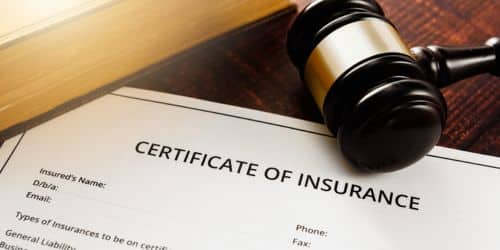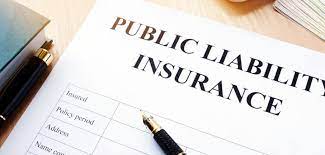A certificate of liability insurance is a document that attests to the existence of general liability insurance or other liability protection for your company. It communicates to clients and prospective partners that your organization is protected from lawsuits alleging property damage, bodily injury, or other harm.
You must first have business insurance coverage to obtain a certificate of liability insurance. The majority of companies ought to get general liability insurance. To confirm their insurance coverage, you may also ask the vendors you intend to engage with for a certificate of liability. In this post, we will define what a personal certificate of liability insurance is, its form and cost, and how to get one.
What is a Certificate of Liability Insurance?
A certificate of liability insurance (COI) is a document that summarizes your company’s liability insurance coverage. It demonstrates that your business has general liability, vehicle liability, or other liability insurance policies. The document does not offer a thorough coverage analysis of your liability policies; rather, it offers a brief overview.
A COI is primarily concerned with liability protection, however, it is neither an insurance policy nor does it offer any protection. Instead, it draws attention to important details about your policies, including their effective dates, policy numbers, and liability limits. For property insurance and other types of insurance, such as liability and car, different COI forms are utilized.
When Do You Need a Personal Certificate of Liability Insurance?
If your firm is looking to lease new property or equipment, or if it is trying to get a contract with another business to perform work or offer a service, you’ll probably require a COI. Before letting you begin a lease or any work, the employing business can need you to provide a certificate. As soon as you anticipate needing one, you should ask your insurance agent or insurer for a certificate.
What’s Included in a Personal Certificate of Liability Insurance?
The Association for Cooperative Operations Research and Development (ACORD), a nonprofit research organization for the worldwide insurance sector, publishes standard forms on which many insurers issue COIs. Others employ their original forms. A COI offers a glimpse of your company’s commercial liability insurance, regardless of the form. In its most basic form, it typically contains:
- The name and address of the producer (a “producer” is an agency or broker).
- Name, address, and contact information for your business
- A list of the insurance companies that cover your company
- Information about the liability protection your business has in place, such as general liability, car liability, umbrella insurance, and/or workers’ compensation.
- A description of the activities, locations, and (if applicable) vehicles of your business
- The certificate’s owner’s name and address (the company that requested the certificate).
- The signature of a representative designated by the insurer to approve insurance certificates
Why Do I Need a Liability Insurance Certificate?
When liability and significant losses are a worry, a certificate of insurance is needed. For instance, if you own a landscaping company, a client can ask for proof of insurance to show that specific liabilities will be covered during the project. Having the appropriate insurance coverage and evidence of insurance will provide you and your client peace of mind and will protect you and your client, regardless of the type of customer you are working with.
It is frequently necessary to get contracts. Many businesses and people who engage contractors want to be sure that they won’t be held responsible for injuries, property damage, or poor workmanship; as a result, they demand that you obtain business insurance.
It’s an advantage to have documentation of your small company insurance, even if you haven’t been requested to provide it. The certificate is typically included in your initial insurance documentation, but if not, they are required to give one to you upon request.
How to Get a Certificate of Liability Insurance
There are a few essential procedures to take to get a COI for your company.
#1. Obtain the information you need:
To receive a COI, one must first inquire about the hiring company’s minimal coverage needs. This essentially involves asking the company for a written statement of the liability coverages and limits of your business needs to secure the contract or lease. To issue the COI, your agent or insurer will require this information.
#2. Hire a broker, agent, or insurer:
Let either of these parties know that you require a COI. Ask your insurance specialist to assist you in determining whether your current policy satisfies the standards if you are unsure. Ask your agent or insurer what changes will be necessary and how much they will cost if your present plan doesn’t match the standards.
Consider the scenario when a prospective landlord requests a $2 million general aggregate limit on your liability insurance. If your policy’s current aggregate maximum is $1 million, your insurance agent should explain the cost of the increased limitations. Request the certificate from your agent or insurer once all necessary adjustments have been made.
Certificate of Liability Insurance Form
The proof of insurance is established and your coverage is enumerated on a certificate of liability insurance form. A document that certifies insurance is known as a certificate of liability insurance (COI) form. You or your company are identified as the policyholder or designated insured.
The form also provides the liability insurance type, policy limits, and start and end dates for the coverage period. This demonstrates to all parties involved your insurance coverage. Your consumers can finalize purchases knowing there is insurance protection by reviewing a COI.
What are the Main Sections of a Certificate of Liability Insurance Form?
The majority of insurers, agents, and brokers utilize a standard form created by the nonprofit Association for Cooperative Operations Research and Development (ACORD). It could also be referred to as an ACORD 25 or just an ACORD certificate of insurance. This COI template contains:
- Date: The time the form was published.
- Disclaimer: Legal language stating that the certificate is only a representation of your coverage and not an insurance policy.
- Producer: The certificate’s issuing insurance broker or agency.
- Insured: The person(s) or company(ies) covered by the policy, together with their name and address.
- Insurance coverages: These can include general liability, professional liability, commercial vehicle, umbrella insurance, or workers’ compensation. Along with policy numbers, effective and expiration dates are also displayed in this area.
- Insurers: All organizations offering the aforementioned insurance.
- Coverage limits: The dollar amounts of coverage that each policy offers, together with the various coverage subtypes.
- Vehicles, locations, and operations description: a general area to respond to inquiries, like being added as an additional insured.
- Certificate holder: The individual or business to whom the COI was granted.
- Cancellation: Notice that if the insured cancels the policy before the expiration date, the certificate holder will be notified.
- Signature: The agent, broker, or the agent’s or broker’s authorized representative’s signature.
Certificate of Liability Insurance Cost
The question “How much does the certificate cost?” is frequently asked about liability insurance certificates. The quick answer is that it shouldn’t cost anything because the majority of agents and brokers offer them free of charge and cover the expense with the premiums their clients pay. The insurance coverage you purchase should be understood by all parties since it is in no one’s best interest to be held liable for a claim due to anything as simple as the cost of a certificate.
However, we prefer to consider the cost of a certificate of liability insurance from a different angle. We consider the perspective of the certificate holder, the organization that will be getting the insurance certificate, as well as the idea of the cost of not obtaining and keeping track of liability insurance certificates. It can cost a business everything if it doesn’t insist on and then confirm certificates.
Yes, maintaining insurance does cost money. Additionally, it is costly to demand certificates of insurance from all contractors, vendors, and other third parties. Verifying the specifics of the insurance coverage, keeping track of it to make sure it doesn’t expire, and making sure that the suppliers modify their coverage as insurance needs change all cost money. The cost is frequently not insignificant either.
When Does Your Company Need a Certificate of Liability Insurance?
People you want to collaborate with can want your business to provide documentation proving it has the necessary commercial insurance. You could be required to present your certificate of commercial insurance to:
#1. Sign a client contract
When signing a contract, a client might ask your business for a certificate of liability insurance. These clients want to be certain that you have liability insurance coverage in case something goes wrong because, in that scenario, they might be forced to shoulder any costs associated with a liability dispute.
Example: A computer repair company enters into a one-year agreement to maintain and repair computers at a university. The university mandates that the company obtain general liability insurance to guard against mishaps that result in property damage to computers or personal injury.
#2. Acquire a new project.
When you bid on a project or approach a new client, you might want to include proof of insurance even if your clients don’t want it. A guarantee of liability insurance reassures potential customers and may increase their willingness to do business with you.
Example: To draw in new business and defend itself against charges of professional negligence, a small IT consulting firm gets errors and omissions insurance (E&O). Because another consulting firm was uninsured, the company gains another significant client by producing an E&O insurance certificate.
#3. Sign a business lease.
If your business leases commercial real estate (such as a store, office, or warehouse), the lease terms may require your landlord to see a certificate of general liability insurance. If a client files a lawsuit alleging property damage or personal injury, commercial general liability insurance will defend both you and the landlord.
Example: A tiny IT training business leases space in a business complex. The business is asked to show a certificate of general liability insurance by the landlord.
#4. Engage in independent contracting work
When you work as a contractor for a company or employment agency, they could demand confirmation of liability insurance. A certificate of liability insurance demonstrates that you have the financial means to resolve any responsibility problems on your own, preventing the agency or company from becoming involved in any lawsuits you could have with third parties.
An IT consultant is provided by a staffing organization to a software company to handle a top client, for instance. The customer brings a professional responsibility case against the consultant when their connection becomes strained.
How Long Does it Take to Get a Certificate of Liability Insurance?
A certificate of liability insurance can already be present in your policy documents if you have a business liability insurance policy. You can exchange immediate digital certificates of insurance with your landlord, clients, or subcontractors by email from some providers, such as biBERK and Thimble.
Other companies that offer business insurance require you to contact or request a copy online, but they should normally be able to give you your COI within a few hours.
Why is My Client Asking for a Certificate of Liability Insurance?
They want to be sure you have the appropriate insurance. Your client wants to make sure you have adequate insurance to guard against certain financial risks related to the activity.
How Do I Ask for a Certificate of Liability Insurance?
Simply get in touch with your agent and let them know the hiring company’s insurance requirements as well as the person’s name and address who is asking for the COI. The agent will give you the COI to give to the business you are working for if the coverages line up.
Is Coi the Same as Liability Insurance?
You can demonstrate that you have general liability insurance by showing a certificate of insurance. A general liability insurance certificate, proof of insurance, or an ACORD 25 form are other names for it.
Why Might I Need a General Liability Insurance Certificate?
whether someone requests proof of insurance, as they frequently do whether you are signing a contract with a new customer, renting out commercial property, or requesting a professional license, you present them with a certificate of general liability insurance. Certificates of insurance facilitate business transactions.
What does COI insurance cover?
It offers businesses protection from liability for workplace accidents or injuries.
Conclusion
Proof of business liability insurance is provided by a certificate of liability insurance. It gives a summary of your liability insurance, including the policy numbers, limitations, and effective dates. You can get a certificate by asking your insurance agent, broker, or insurer for one. As soon as you anticipate needing a COI, you should apply for one. You can be prevented from beginning work or leasing property by a general contractor, property owner, or other company until you’ve provided a signed COI.
Related Articles
- COI INSURANCE: Meaning & How To Get The Insurance Certificate
- UNIVERSAL LIFE POLICY: Definition & How it Works
- AVERAGE COST FOR BUSINESS INSURANCE IN 2023
- SHARE CERTIFICATE: Overview, Templates, Rates, Formats(+Quick Tool)
- What is the AVERAGE COST FOR BUSINESS INSURANCE? (Detailed Guide)






